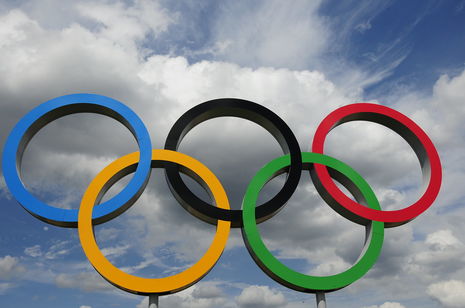The knot between sport and politics is impossible to untie

The iconic and symbolic Olympic RingsHer Majesty’s Government / CC BY 2.0
A year after the Russian invasion of Ukraine and just a year before the start of the Paris 2024 Olympic Games, politics and sport have once again made headlines. The IOC’s recent decision to “explore a way” for Russian and Belarusian athletes to compete as “neutrals” on the basis that “no athlete should be prevented from participating solely because of their passport” has international community caused an uproar around the world. Many countries want a ban on Russian and Belarusian athletes, even threatening to boycott the games as a show of solidarity with Ukraine and the illegality of the Russian invasion. Britain’s Culture Secretary Lucy Frazer chaired a 36-nation summit to discuss the IOC’s latest move, with Ukrainian President Volodymyr Zelensky declaring that Russia’s actions “cannot be hushed up with a pretense of neutrality or a white flag”.
Whatever the outcome, this whole predicament has proved one thing. Politicians have once again dealt a knockout blow to sporting neutrality. The Olympics is an incredible movement that inspires millions of people through the wonders of sport. But as much as the IOC likes to present itself as a pure and politically neutral entity, and despite its good intentions, the notion that the Olympics can exist outside the realm of politics is a myth. Top sport is and will remain political.
If we delve into history, politics permeates sport. From the boycott of the 1980 Moscow Olympics to the Soviet invasion of Afghanistan to the terrorist attack during the 1972 Munich Olympics to Black September, the Olympics are inseparable from political issues. Tommie Smith and John Carlos’ Black Power Salute in Mexico 1968 used the Olympics’ global audience to shine a spotlight on race and civil rights. Political conflicts are also reflected in games, such as the “Blood in the Water” polo match between Hungary and the USSR in 1956, just weeks after Soviet tanks crushed the Hungarian uprising. The Miracle on the Ice hockey game between the USA and the USSR at the 1980 Winter Olympics was a showdown between competing political systems and ideologies.
“Top sport is and will always be political by nature.”
Even in the 21st century, sport is still used as a platform for political messages. Kneeling as a sign against racism, debates about gender and pay, and the exposure of human rights violations and the treatment of migrant workers by World Cup host Qatar are just a few examples. Undoubtedly, sport continues to have global political significance. The magnetic attraction between sport and politics is stronger than ever. In an era of globalization, 24/7 mass media and hyper-commercialization, sport transcends everything we do. It has become an understandable metaphor for everyday life, tangible and applicable to many situations.
Sport, due to its immense popularity and global reach, is a channel for delivering social and political messages to huge, captive audiences. Nations see sport as a political panacea, as hosting a mega sporting event promotes nation building and branding. It facilitates the demonstration of national power, enables image improvements, provides global notoriety and is a way to ingratiate nations into the international community. The global scrutiny this requires can be a double-edged sword. But the risk is worth it. More people tune in to the Olympics than the UN. For many non-democracies, public legitimacy depends on merit, as was seen in Beijing 2008. The Olympic medal table acts as a barometer of state power, enhances a country’s prestige and fuels nationalist pride. That’s why governments are pouring money into the sport and why Russia went to such extreme lengths to launch a state-sponsored doping program to ensure its success at Sochi 2014.
Dressed in the idealistic rhetoric of peace, solidarity and fair play, the Olympic Games seek to cleanse itself of the pollution of politics. But sport, like any other facet of life, is contaminated by politics and it would be naïve to say otherwise. While the dream of uniting the world under the umbrella of the Olympic Charter is certainly laudable, it does not reflect reality. Much as we would like, the Olympics cannot go beyond politics. Politicians have cornered the IOC. Saying nothing or declaring oneself neutral is itself a political statement. It is evident that the Olympics are so ingrained in the global political game that any denial would be ridiculous.
The tragic reality is that politics and profit take the gold and silver medals while athletic excellence is relegated to bronze. Olympia needs politics, and politics needs Olympia. There’s no way around it. Let’s not kid ourselves that the Olympics can ever be apolitical. The knot between sport and politics cannot be untied.